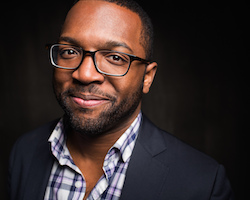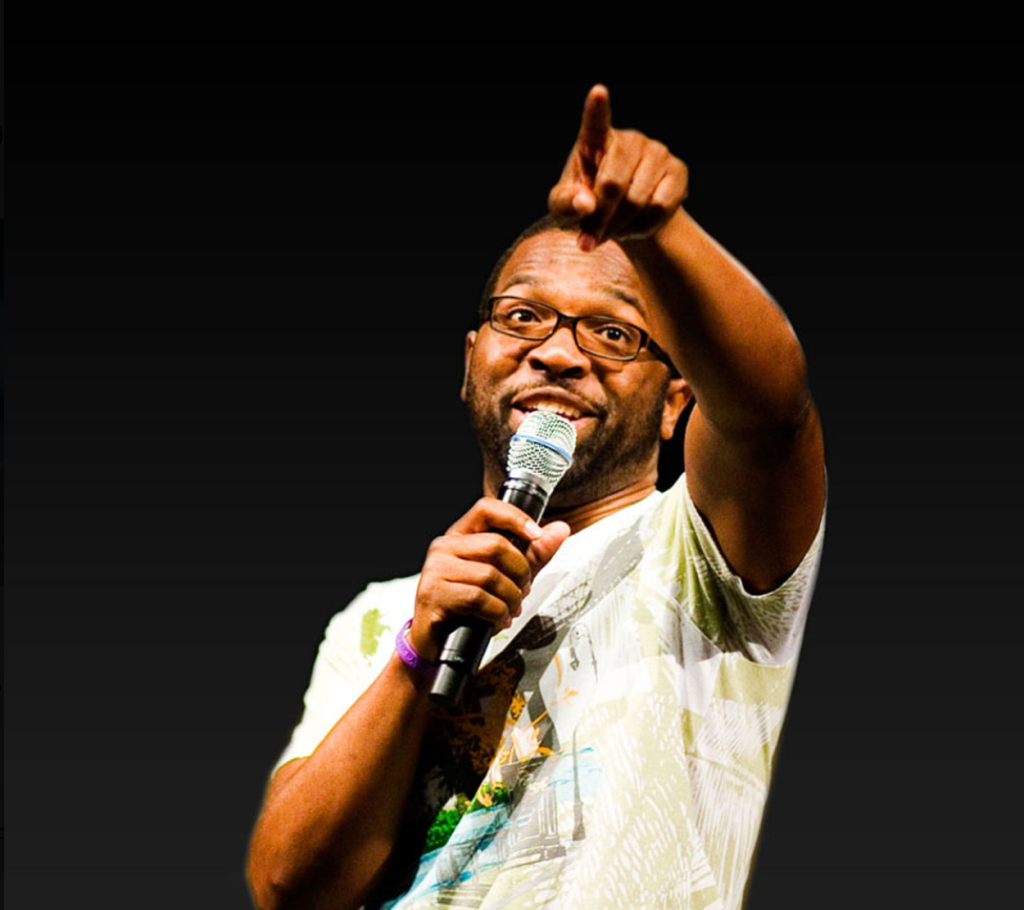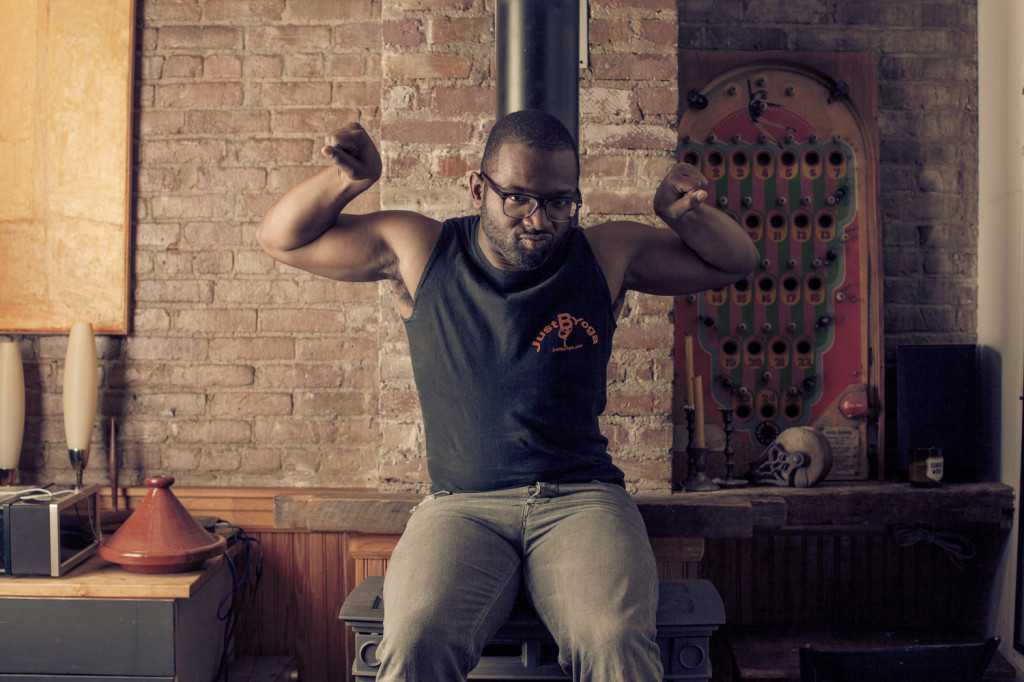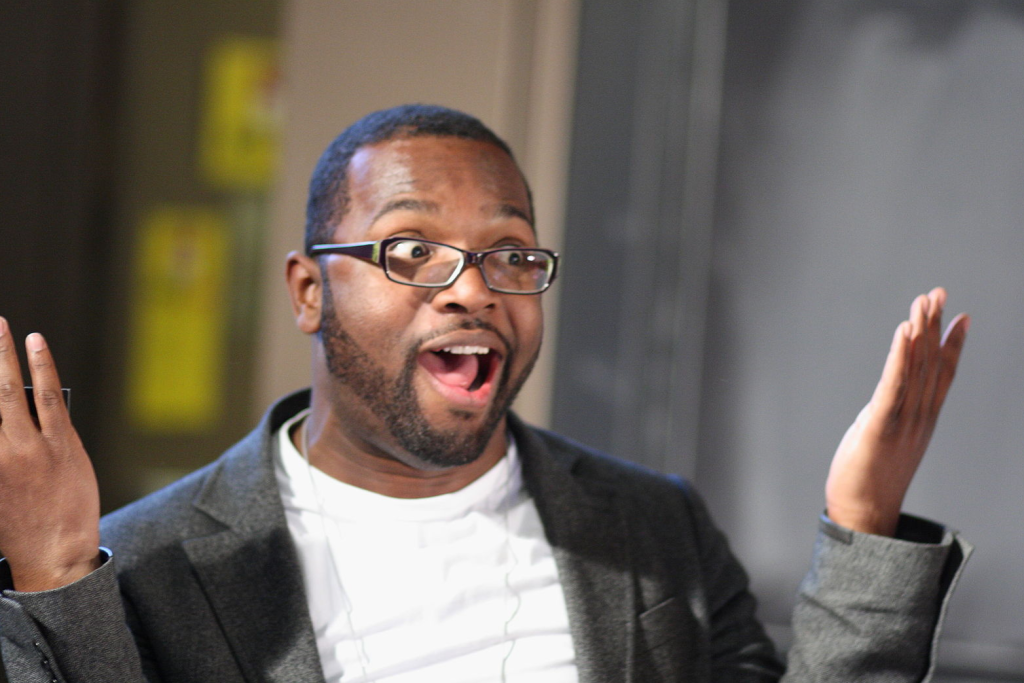To call Baratunde Thurston a serial entrepreneur is, to put it mildly, an understatement. He’s the CEO of Cultivated Wit, author of How To Be Black, columnist at Fast Company, headliner at uberconference South by Southwest, cofounder of the political blog Jack and Jill Politics, White House advisor, stand-up comedian, ex-digital ninja for The Onion, an ex-consultant—and it seems like he’s connected to everything and everyone in between.
TBQ’s Ami Cholia caught up with Baratunde a day after he returned to civilization from one of his now-periodic “unplugs,” the first of which was the subject of a cover story he wrote for Fast Company. ‘Unplug’ requires the hyperconnected Thurston to refrain from social media updates, emails, check-ins, likes, pokes, tweets, hashtags, Instagrams, selfies, etc. In one of his favorite East Village hangouts, he discussed building brands and empires, the consistent overlap of technology, humor, and politics in his life, and the need for throwing our phones in the nearest large body of water every once in a while.
TBQ: You’re just coming off Unplugged Part 2. Why do it?
BT: It’s peaceful. I like to be alone with my thoughts from time to time, and that’s increasingly difficult because we’re so interrupted by the thoughts of others. We’re in an age where we constantly need to express every moment. I like and relish the chance to just experience things without sharing them or documenting them. To exist in the world without being prompted by some app notification; to have a conversation with somebody who’s physically in front of me.
This year I also went away [to Hawaii], and that was nice—I slept so much. And that’s the other thing, when I’m not on email it’s easier to sleep, because I don’t take this little nagging device to bed with me. It’s a harsh transition, to go from having a LED screen up in your face to dreamland.
Yet so much of what you do—so much of the brand Baratunde—is being online and connected.
The self-discipline is a hard thing. We’re pretty weak when it comes to wanting things and following through on the things we want that are also good for us. I have the nice challenge that people are talking about me. So the ability to step away is in part will and just knowing how I work best, which is not actually always on. And I’m not abandoning it, I’m not like “Oh, technology’s horrible, destroy the machines.” I think we should—maybe—put some leashes on them from time to time, or put them in another room from time to time.
You’ve said in the past that you felt like you’re becoming addicted to yourself.
That is a challenge for all of us. And I think I experience the challenge more because I’ve chosen a public life, a performing life—an expressive life. I obviously think pretty highly of myself if I’m going to write things and say to people, “Read my words! They’re really important! Watch me!” So there’s already caution built in about assuming a stage world. On the other hand, there’s the tech stuff. We have cameras everywhere. We’re documenting everything, and of course now there’s the whole ‘selfie’ culture.
It was the word of the year last year.
Jesus Christ, we’re just so stupid. But yeah, the metrics and the notifications that come along with all this—the prying, the curiosity, the need for satisfaction. I think the factors that lead to self-addiction are stronger than ever, because we’ve got tools to look at ourselves, to share ourselves. Maybe people were talking about my show before, but I didn’t know it because they were talking, and I didn’t have audio monitors around the globe. And now they’re typing, and it’s auto-searchable, and they’re tagging you. It’s important for me to try to maintain a little humility in the face of all that. I need to create a little distance from myself, to remind myself that I am capable of asking questions too. I need to remind myself that I can intake information and not just spew thoughts.
Given all of that, given that you’re a writer, a comedian, a television show writer, you have a technology startup, you used to be a consultant—is there a method to the madness?
*******
Partly, I’ve just gone through doors that were open. And I’ve experimented. However, there’s been a consistent set of interests: technology and how it can empower us, and comedic expression. I like the idea of humor and creativity as a way to connect. Technology is a great superpower that requires a level of conscious engagement, and I think I’m evolving from pure cheerleader to conscious engager. I’m ultimately a communicator; comedy’s a way to do it, the tech is a way to do it.
I think there are realms that I care about more than others. I care about identity, race, and equality. I care a ton about the power of humor for fun, and for purpose. And I care about the future digitally. We’re moving so fast, and I recognize that tech is the language to maintain linguistic relevance. Without it, we’re going to lose the ability to connect with other people. And you can’t talk about identity and race and politics if you’re not fluent with the tools. You can’t really connect with an audience with your humor and your message if you’re not using the tools of the day.
How do you think conversation has changed, especially about things like identity and race, because of technology? How do you think they’ve evolved?
They’ve definitely evolved. I think we have more opportunities to express our full selves because we can find communities of like minds everywhere. You’re no longer the ostracized weirdo nerdy black kid, because you’ve got people like Childish Gambino out there rapping. That was a semi-secret society for a while, and now there are Tumblrs all about it.
The negative is that the we’re hyperexposed in a superficial way to a lot of different cultural experiences, and we don’t carry the history with those bits. The context is often lost. We’re actually very disconnected from each other in a time of hyperconnectivity. We have these little water cooler moments and don’t have the questions to ask. Where does this come from? What does this mean?
One of the great risks, I think, of the technology era with respect to cultural identity—is that we lose context, we lose history. And it’s a little ironic because we have all these hyper-memory tools. Storage has never been cheaper. Yet we’ve never been more forgetful than we are today.
But rapid ignorance seems to be winning, no?
We’re in a world where you’ve got a generation growing up where everything’s available—YouTube, Snapchat, Twitter, etc. They grab a bit from here and a bit from there, but they don’t know my history or your history. There is some benefit to not knowing history, because you’re not bound by it, by its expectations. You’re not inheriting its habits. That’s kind of cool. And so, even on that downside, there is a little upside to the freedom to craft the society that you want to live in.
The problem is, I think we’re not that smart. We’re not that powerful. And our politics and economics are not that liberated. It’s a very luxurious position: I’m just going to create the future! That still presupposes access, literacy and economic understanding. I think the risk is tremendous if we split our society into a world where you have vast freedoms and electives for a certain category of people who have a base level of access and knowledge. And then there are people who are stuck in history and bound by the rules of the old world, because they were never really brought in to the new one with consciousness, or with creative engagement. That’s a terrifying future, because the people in group A don’t see the people in group B.
I wrote about this in one of my Fast Company columns: I imagined this wearable technology future where we had such an odd mix of reality around us—or a certain category of us did—that we literally didn’t see the people we didn’t like. You could choose to never hear a small dog barking, never hear a baby cry. You just tweak your little audio implant to mute certain frequencies, and you’re taken on a path to work that avoids undesirables or people that are not in your social network. That’s a great freedom, but it’s actually terrible. It’s the echo chamber. By only seeing what you want to see, you stop learning, you stop empathizing, and you don’t see yourself as part of a nation state.
How do you see Cultivated Wit fitting into the larger landscape of where we are today?
We’re going to save everyone. Everybody. [laughs] We’re the one true company, and you must bow down. Pledge loyalty and all will be okay.
We operate in a range of areas. The core is very similar to my own: humor, technology, creativity. And on a purely creative front, it’s about advancing the medium in which we can create, especially comedically. How can we be funny in new ways? It’s an intellectually interesting question to us. Stand-up is a fun medium, improv is a fun medium; film, sketch, video games, Twitter bots, Tumblr memes, augmented reality. Can we bring innovation and tech into the world of comedy and humor? Can we bring comedy and humor into the world of innovation and tech?
*******
Machines can’t do it all on their own. Algorithms can’t do it all on their own. They can certainly assist. But they can’t complete that circle.
I am excited about some of the creations that have come out of our comedy hackathons (ed note: next one is June 13—14, 2014). There’s technology people, there’s comedic people, and there’s designers who are building funky, weird apps that often have satirical takes. Someone did a Tinder-type app that was predicated on pets. If you like that other person’s dog, then you’ll probably like the other person. You also recognize that they’re going to love their dogs more than they’ll love you, and you accept that from the beginning. Then there was a Shazam for hipsters, where this tool quietly identified the song that was playing. You look like you’re checking your Twitter account, but the app texts you insider information about the song that’s playing, the director that made the music video, for example. The app plays up our need to know everything, especially when we pretend to know everything, to sound like we have access to all this info. So, those are funny, but they’re also commentaries.
So are you looking to support new entrepreneurs?
Most of the people who come to our Comedy Hack Days are not entrepreneurs. Entrepreneur implies I’m trying to build a business. They are creative, they are technically and visually intelligent, they’re not coming to this thing to start a company. We play in this world which is bringing people together physically. The comedy hack days are not an online exercise. We put people in a room, lock the door, fill it with beer, some people drown. But the survivors—
You don’t feed them?
Actually we do, it’s the best food, it’s great. It’s all local and massaged and everything.
But that community—that physical community of these different types of people—it’s also what we try to do with Whiskey Fridays [Cultivated Wit’s happy hour series bringing together people in the tech and creative communities]. We’re socially bringing different types of people together. We introduce teams to tech companies, or to creative companies, who might want to partner around their concept. The companies that sponsored the event, we connect them to some of that talent. And we’ve hired some of those people to work on our own projects. There may be a future where there may be some product that they initiate that we continue with, or vice versa, and we find a way to partner financially or labor-wise or promotionally.
People think of business as being stuffy. You’ve turned that on its head.
I think it’s less about business and stuffiness and really has to do with how both commercial and cause-based entities—all kinds of marketers—are trying to talk to people, which is often badly. All kinds of agencies have their twist on it. We use emotion. We use the heart. We’re just really smart! Our twist is, we’re funny, and we’re technically savvy. We understand the social mores, so we’re going to be more participatory, more mobile-centric, more Millennial-oriented, but it’s going to be fun. You don’t have to shout at people all the time; you can do it in a fun way. Especially if you have something good to say—about healthcare, or voting, or recruiting teachers. How do you make that cause stand out against yet another cat video? Against the internet outrage meme of the moment? And so what we try to bring, especially to that client base, is relevance, resonance—and humor definitely stands out above a lot of that noise.
Where do you see something like Cultivated Wit going?
Being known as a place for really creative, fun, innovative, smart things to happen. Some art shows, some fun events, some really creative products, and some really high quality service. And the service should become so awesome that we’re just batting people away. “Get out of here! We don’t have time for this bullshit, Obama!”
We should be beloved by, well, not everybody. If everybody loves you, you’re probably not doing something interesting.
Are you still doing AOL’s “Funded”?
That season’s over. It was a ten-episode run. I’m not sure about whether we will do another ten, whether they want us to do another ten, or if we would want to do another. It was a great experience. But I do know we’ll be creating another type of series, probably a podcast, probably an audio podcast, a radio-type thing, that would be more home-grown.
Do you see a convergence of tech entrepreneurship and creative entrepreneurship?
Look at journalism. Journalism has gotten really interesting. The entrepreneurship within journalism is accelerating. Journalism was institutionally based. The programs you went to, the internships—you started off as a junior reporter, you travel around to podunk villages covering fires and crimes and local politics, and work your way up to maybe be a correspondent, a regional news broadcaster, make your way to Brian Williams’s chair. And that’s clearly not the only path anymore, maybe not even the major path. Comedy’s similarly interesting. People used to shoot for sitcoms, and film deals, and HBO specials, and there was this established path. You get your five minutes, you get an agent, pitch a network, name your production company, you do a festival, you get seen, some A&R type person views it.
*******
First through just promotion on social media, then the tools available, Final Cut [Pro], all that stuff. Producing, editing, distributing, monetizing, selling merchandising, iTunes, Amazon Direct — there’s been an explosion from the creative world getting into entrepreneurship and tech. Even if it’s not to make money, it’s about making a little bit more money. It’s gaining a little bit of audience doing what you love to do.
From the tech side, we need more from the creative world. You see this nearly blind reverence for engineering process, algorithms, et cetera. Google doesn’t hire people, they hire robots. But there are limits to that. Tech companies are now trying to get into content. Look at Twitter. Twitter tried to be just a platform. Now they’re hiring writers and buying media platforms like Vine. Facebook is trying to compete with media platforms. Google Plus is getting into interesting narrative things and telling stories. It’s happening. There’s someone who’s nineteen right now, or nine. I’m excited to be a part of that wave of people, tinkering to figure it out.
And how does crowdsourcing fit into this model?
Crowdfunding creates a whole lot of new opportunities and a whole lot of new challenges. We’ve all got GarageBand; it doesn’t mean we’re all going to start great bands.
But the thing that’s exciting about crowdfunding isn’t the money. It turns the product development process on its head, and it forces you to go to a community and get feedback. And what you ultimately launch is more vetted. It’s been sampled. The idea of going off into sequestration, or going into a closed lab door and creating something—it doesn’t have to be that way any more.
Marketing is our thing in the US. We are very good at talking about how good we are. We’re number one in thinking we’re number one. Confidence versus ability is what we have going. The ability to talk about ourselves.
When I wrote my book, I shared the process of writing a few chapters with people. I let people watch as I was editing. It was my way of bringing a digital twist to the ancient form of book writing. It was my way of engaging the public, without having them directly contribute to the book. I would not want to write an entire book like that. I learned a lot. There’s a risk to opening up everything to an audience; it affects how you think. It embellishes the outcome.
It’s important to note that not everything should be crowdfunded. Some things just need one good lab to fund them, and it requires five people sequestered in a room.
So much of what you have become was through marketing and establishing your brand. How does one become a successful entrepreneur without that?
I think about markets; I think about reaching a community and an audience. I am an artist for sure, but I am also an entrepreneur. There’s a tension that is healthy. Go to an extreme, and you lose something valuable. You’re not doing anything truly interesting or novel if you’re just focused on earning a dollar. It’s about being in that spectrum in the middle. I was always on stage, but I was always a hustler. My evolution both creatively and entrepreneurially has always been about how do I take the best of these things. Because I have been really heavy on loudness. Talking, tweeting, photo sharing, et cetera, et cetera. When I need to get stuff, I have to mute myself. A constant state of performance is a problem.
What advice would you give aspiring entrepreneurs?
*******
Here’s the twist on all that public talking about yourself. A lot of people get nervous about social media, at a lot of the talks I give, people often tell me: “I don’t have anything to say.” Ok, then listen. We undersell that, as a nation and as a digital society. The other big piece of advice I have is: you don’t have to be me, or anyone like me, or someone like Gary Vaynerchuk, or anyone who likes talking a lot. You can listen really well and get great advantage from that. Then do something, make something, and throw it out there.
•
 Baratunde Thurston is the CEO, co-founder, and hashtagger-in-chief of Cultivated Wit. He wrote the New York Times bestseller How to Be Black and served for five years as director of digital for the satirical news outlet, The Onion. When he’s not delivering keynote talks at gatherings such as SXSW Interactive, LeWeb, and Personal Democracy Forum, he writes the monthly back page column for Fast Company and contributes to the MIT Media Lab as a director’s fellow. He co-founded the black political blog, Jack and Jill Politics, has advised the Obama White House, has more than 10 years’ experience in standup comedy, and more than 30 years’ experience being black. He lives in Brooklyn, NY.
Baratunde Thurston is the CEO, co-founder, and hashtagger-in-chief of Cultivated Wit. He wrote the New York Times bestseller How to Be Black and served for five years as director of digital for the satirical news outlet, The Onion. When he’s not delivering keynote talks at gatherings such as SXSW Interactive, LeWeb, and Personal Democracy Forum, he writes the monthly back page column for Fast Company and contributes to the MIT Media Lab as a director’s fellow. He co-founded the black political blog, Jack and Jill Politics, has advised the Obama White House, has more than 10 years’ experience in standup comedy, and more than 30 years’ experience being black. He lives in Brooklyn, NY.



